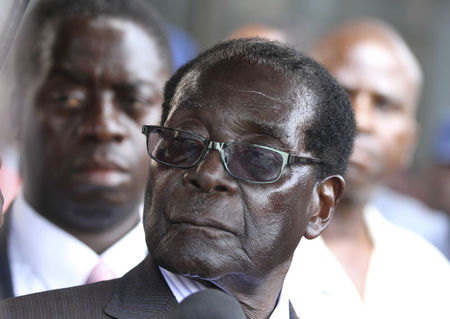By Ed Cropley
JOHANNESBURG (Reuters) - A senior Zimbabwean minister on Friday slammed a report by two South African judges that said Zimbabwe's 2002 elections, won by long-time President Robert Mugabe, were not free and fair.
At the time of the vote, then South African president Thabo Mbeki glossed over observer reports of irregularities, including violence and intimidation, to declare it reflected the legitimate will of the Zimbabwean people.
But two judges commissioned by Mbeki - Sisi Khampepe and Dikgang Moseneke - compiled a separate assessment which was only released this week, after a South African newspaper won a 12-year legal battle to have it declassified.
The so-called "Khampepe report" was scathing.
"Having regard to all the circumstances, and in particular the cumulative substantial departures from international standards of free and fair elections found in Zimbabwe during the pre-election period, these elections, in our view, cannot be considered to be free and fair," it said.
Zimbabwe's finance minister Patrick Chinamasa - justice minister at the time of the vote - said the Khampepe report was the product of a racist South African justice system opposed to the seizures of white-owned farms taking place at the time.
"It's rubbish. I'm telling you it's rubbish," Chinamasa told Reuters on the sidelines of an investment conference.
"It's not the South African government. It's an individual judge who is biased against us because of the land reform programme," he added.
"You know, we've had a lot of bad judgements by the South African courts, especially the white judges."
Both Khampepe and Moseneke - now deputy chief justice - are black. Mbeki has not commented on the release of the Khampepe report.
Zimbabwe's main opposition, the Movement for Democratic Change, has accused Mugabe, 90, of rigging elections and intimidating voters since 2000 - charges his ZANU-PF party denies.
After re-election last year, Mugabe's term of office runs until 2018 and he can run again.
ZANU-PF's leadership is currently embroiled in a battle to succeed Mugabe, the only leader Zimbabwe has known since independence from Britain in 1980, but Chinamasa denied it was of pressing domestic or international concern.

"He was voted in last year for a five-year term, so why is the issue arising?" he said.
(Reporting by Ed Cropley; editing by Andrew Roche)